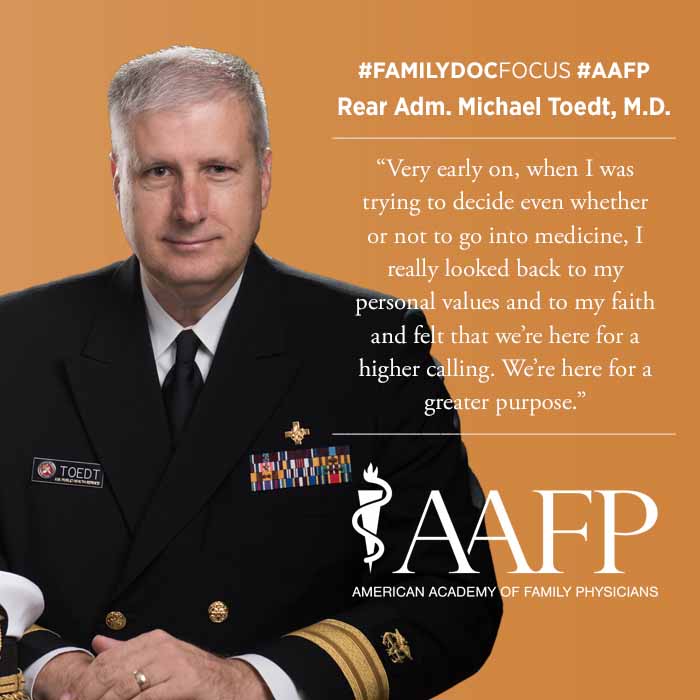Following a Calling to Bolster Public Health
August 12, 2019 10:52 am Jill Sederstrom – From an early age, Rear Adm. Michael Toedt, M.D., knew he wanted to help underserved populations.
"Very early on, when I was trying to decide even whether or not to go into medicine, I really looked back to my personal values and to my faith and felt that we're here for a higher calling," he said. "We're here for a greater purpose."
That explains why Toedt has devoted most of his career to working with the Indian Health Service, the agency responsible for providing federal health services for American Indians and Alaska Natives.
His primary goal has been to advance public health and enhance outcomes for underserved populations, and he's been able to do just that during his lengthy career in family medicine by improving how family physicians communicate with patients across cultural barriers, pioneering efforts to boost clinical outcomes through the use of electronic health records and, more recently, fighting the opioid crisis.
"It's just something that I feel called to do," he said of his focus on public health.
Toedt's work with the Indian Health Service began when he was a medical student at the Uniformed Services University of the Health Sciences in Bethesda, Md., the foremost educational institution in the nation devoted to training career uniformed services leaders in the health sciences.
After completing a residency in family medicine and a fellowship in obstetrics at the (then) Franklin Square Hospital Center in Baltimore, Toedt landed a job as a staff physician on the Cherokee Indian Reservation in Cherokee, N.C.
"I really did full-spectrum family medicine," he said, adding that the post was both a challenging and a rewarding foray into public health.
As his career has progressed, Toedt has played a more active role in developing systems of care and creating overall strategies to improve public health for this historically underserved population.
The patient population he serves often faces documented health disparities -- including higher-than-average incidences of substance abuse, diabetes and intimate partner violence -- but Toedt said he has been struck by the perseverance and strength he has seen within the community.
"These are all things that are challenges that American Indians and Alaska Natives face, but at the same time they have such resilience and strength that I think really leads them to improvements in those areas," he said.
In his role as acting chief medical information officer for the IHS, Toedt led clinical informatics for the federal health care provider and examined the role EHRs can play in improving health outcomes. He also provided leadership and guidance for the IHS Nashville Area as the chief medical officer for that region before being named to serve as chief medical officer for the IHS.
In his current post, Toedt provides national leadership on clinical and community health-based programs and helps create new policies to serve the underserved patient population.
But even as the commissioned officer's career has led him take a more holistic view of public health, one of his primary focuses remains improving the relationship between doctors and patients.
"We have to really protect our relationship with our patients, and at the Indian Health Service, we're focusing now on relationship-based care," he said. "We are focusing on the relationship we have with our patients, the relationships that we have with each other as the health care professionals … but also our relationship with ourselves.
"The caring connection between patients and families and health care staff, healthy staff relationships, and intentional self-care are all crucial to facilitating the healing environment we aspire to in the Indian Health Service."
